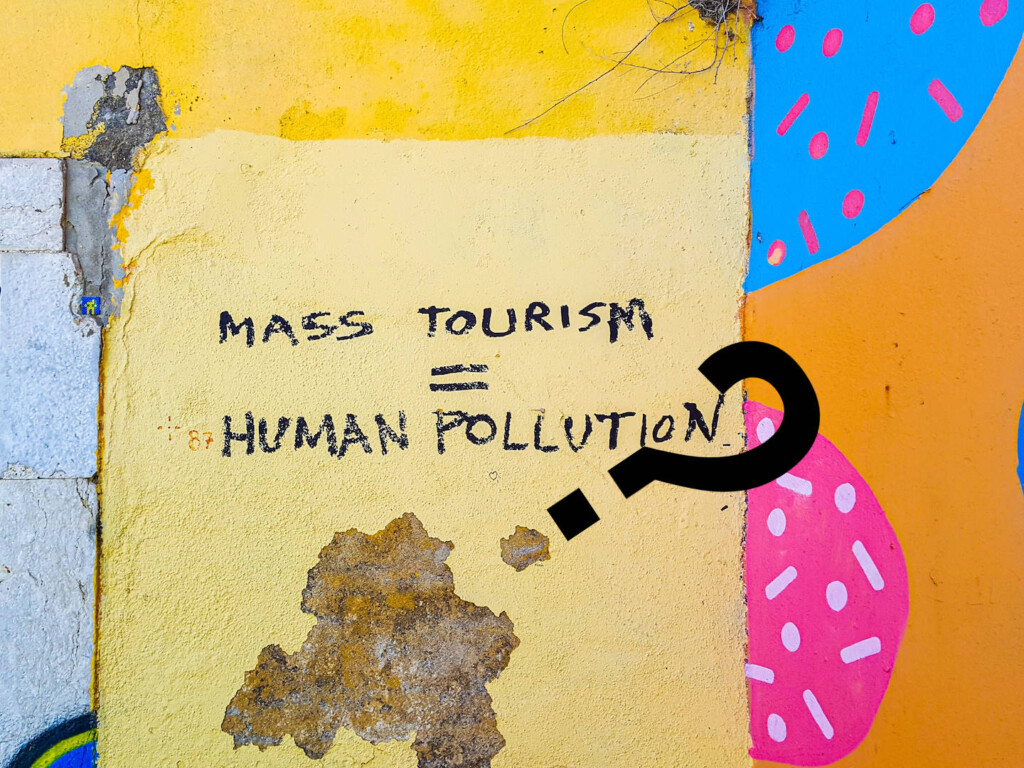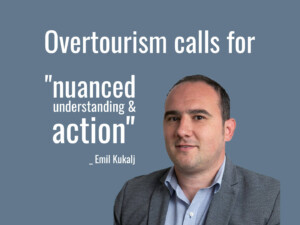

The "Good Tourism" Blog
For diverse perspectives on sustainable tourism & responsible travel ... because travel & tourism is everyone's business., what is ‘mass tourism’ and what’s the problem.

What is ‘mass tourism’? How do we think about it and talk about it? Do we consider all of its contexts, costs, and benefits?
Does mass tourism contribute to good lives? Or do ‘the masses’ only represent threat?
Does leisure travel for the many have its place in a ‘green’ future for us all? Or will it remain the privilege of a few?
Vilhelmiina Vainikka shared this “Good Tourism” Insight at the invitation of Tourism’s Horizon: Travel for the Millions , a “GT” Partner. (You too can write a “GT” Insight .)
Table of contents
What is ‘mass tourism’ .
Why would anyone ask such a question? Isn’t the answer obvious?
Presumably everyone using the term — in industry, academia, and in general — has some idea of what mass tourism might be. After all, it’s likely we have been tourists ourselves, many of us live in places that attract tourists, and many work in tourism.
Mass tourism is integral to our culture. But, as Raymond Williams argued in relation to the term ’culture’ itself, its ubiquity masks a range of contested understandings.
Don’t miss other “GT” posts tagged ‘Carrying capacity, mass tourism, & overtourism’
Researchers of tourism have probably had to define mass tourism in their publications. Tourism students have probably had to learn one or more definitions. We can say that most people — academics too, despite claimed expertise and authority — hold socially-constructed views of mass tourism.
There are many different definitions of and perspectives on mass tourism. My own doctoral research concentrated on the different ways professionals — academic researchers, package tour agents, and tour guides — think of mass tourism.
What is ‘mass tourism’? Quantitative vs qualitative definitions
When we define something, we are simultaneously part of creating that phenomenon. Language conveys meaning, but also constructs it. Definitions make something an understandable entity, drawing lines where it ends and something else begins.
One way to define mass tourism is as a quantitative notion. ‘Mass’ implies a large scale, involving many people (in relation to the global, regional, or local context in which mass tourism is perceived).
This quantitative notion is often tied to qualitative characteristics. Large numbers of tourists may be understood in a positive, neutral, or negative way. Today it is often understood as problematic, for example in the debates on ’overtourism’.
Mass tourism can also be approached in other, more qualitative ways:
- It can refer to a mode of production/consumption . So, for example, we might think of Fordist mass production, or economies of scale of mass production.
- It can refer to spatial specialisation . The resort as a space for mass tourism is an example of this.
- It can also carry a strong association with democratisation , such as access to tourism by sections of society; by social class , for example.
All of the categories mentioned above have changed — none are static — adding to the reality that mass tourism really needs thinking through.
Equally, mass tourism can also be understood as a ’super-umbrella term’ for tourism for ’the masses’, which combines the aforementioned perspectives. This suggests that numbers of tourists, the mode of production, the politics of consumption, physical manifestations such as the resort, and democratisation, are all part of a wider ideological and political infrastructure that we might call ’mass society’ or ’mass culture’.
The super-umbrella approach connects tourism to all of its historical, economic, and political contexts: the development of industrial society, political change, growth, (in)equality, technological advances, and infrastructures.
Notably in this framing, the niche modes of tourism (ecotourism, for example), which are often aesthetically and culturally counterposed to mass tourism, can be seen as being part of the mass phenomenon of tourism, just like the resort. This underlines the complexity of the phenomenon today.
Also read Sudipta K Sarkar’s “Good Tourism” Insight ‘Ecotourism for the masses, not the elite classes!’
Contexts for mass tourism: The ‘good life’
Context is important. Mass tourism is contextualised on spatial, temporal, and scalar terms; we experience it in space, time, and at a scale. Therefore, it is necessary to zoom in on different local, regional, and national contexts in which mass tourism is taking place. The histories of different communities with mass tourism, whether as destinations or as sources of tourists, are meaningful in understanding contemporary lifestyles and ideas of what constitutes a ’good life’.
Is mass tourism a singularity or a plurality?
The ‘mass’ in mass tourism is both a singular and a plural . The relationship between the two is key. In discussions of mass tourism, characterisations of the singular mass, or ’the masses’, can obscure the plurality of individuals, and individuality itself.
I have argued in my research that the usefulness of mass tourism as a concept is embedded in addressing this very relation; reflecting on what the ‘mass’ symbolises and what consequences it has for how we see our fellow humans.
Erik Cohen has urged more research on mass tourist experiences and underlined the possibility for both collective and individual experiences. We should allow space for both the singularity and the plurality in the discussions we have of mass tourism.
Are the masses a threat?
Seeing large numbers of people as a threat is not new, nor is it only a feature of debates about tourism. Christian Borch noted that crowds have often been perceived more as a threat than a solution in society .
Classical crowd theories hold that individual agency and individuality are lost in the mass mind, and that crowds threaten the social order. These theories emerged in part as an elite fear of unrest among the urban working masses. One could argue that these fears are sustained through contemporary prejudices.
Also read Jim Butcher’s “GT” Insight ‘Was this the European summer of terrible tourists? Give us a break, media!’
These ideas, and their modern manifestation, are often reductive. Rather than threatening, the crowd can be the very thing that is attractive about tourism experiences. For example, Jillian Rickly reminds us that part of the appeal in tourism are the events in which crowds gather and create an authentic experience.
Certainly, tourism is a form of competitive consumption. Often we wish there were no other tourists, and certainly no crowds, at the places we wish to admire and enjoy. But equally, in other contexts, crowds can be exciting, fun, human; the very essence of what anthropologists refer to as communitas .
Let’s talk about mass tourism … deterministically or flexibly?
Whether we are researchers, authorities, or tourism industry professionals, it matters how we discuss mass tourism . If we use a deterministic discourse, we liken mass tourism to a mould. Into that mould we pour the experiences of millions, but turn out a single, uniform entity: stereotypical mass tourism.
However, if we use a flexible discourse on mass tourism, we recognise that the phenomenon, including its production and consumption, changes over time and as technologies and knowledge are developed. This acknowledgement requires us to take a more dynamic conceptualisation and wider perspective on mass tourism. As a result, we get a more realistic portrayal of the phenomenon, which can lead to more fruitful discussions on its status and future.
Mass tourism vs the green transition
When we follow the discussion on the green transition for a sustainable future, we are challenged by the issue of ’quality over quantity’; a better type of tourism . It sounds reasonable because, of course, we wish tourism standards to be high in relation to the environment and local communities.
But as destinations seek to optimise benefits from tourism, ’quality over quantity’ can mean in practice ’the upper classes versus the masses’; ’quality’ tourism for the rich and better educated; ’quantity’ for the less enlightened ’mass tourist’ stereotype.
Also read Peter Smith’s “GT” Insight ‘For the sake of the world’s poor, might the risk of overtourism be worth it?’
Perhaps we should invest more in finding ways to accommodate as many as possible, while considering that tourism could be something different from what we have practiced so far. This may also make it easier to win support from ‘the masses’ — individuals seeking their own versions of the ‘good life’ — for reducing carbon emissions and addressing environmental concerns.
Ultimately, the masses vote, produce, and consume. Progressive, sustainable change needs to come through them. Caricatures of mass tourism are unlikely to win friends and influence people.
Mass mobilities
Finally, researchers have begun to investigate how climate change influences the mobilities of people, naming it ‘ climate mobilities ’. It is likely that we will face a blurring of the previous categories of mobility.
Climate change, and the impacts it has on different places, will likely increase migration and affect tourism. Categories of travel — voluntary/involuntary, leisure/residential, migration/refugee, short-term/long-term, etc — will be further complicated.
Therefore, we need to discuss how societies and mobilities will be constructed and for whom. Through it all we should remember that ‘the masses’ are the ’we’ and the ’us’; the ‘you’ and ‘I’; the prospective beneficiaries of true sustainable development.
What do you think?
What is ‘mass tourism’ to you? Share your own thoughts in a comment below. Or write a deeper “GT” Insight . The “Good Tourism” Blog welcomes diversity of opinion and perspective about travel & tourism, because travel & tourism is everyone’s business .
“GT” is where free thought travels.
About the author

Vilhelmiina Vainikka is a post-doctoral research fellow at Tampere University , Finland. She is working on the HUMANE-CLIMATE project (2022 – 2026), “the civic potential of climate mobility”, which is funded by the Academy of Finland.
Dr Vainikka contributed this “Good Tourism” Insight at the invitation of Tourism’s Horizon: Travel for the Millions , a “GT” Partner.
Featured image (top of post)
What is ‘mass tourism’? Is it, as this graffiti asserts, “human pollution”? Image by Mark de Jong (CC0) via Unsplash . “GT” cropped the image and added the dangling ‘?’.
Contents ^
Related posts

This site uses Akismet to reduce spam. Learn how your comment data is processed .
Privacy Overview
Mass Tourism: History, Types, Advantages & Disadvantages, Destinations and Its Impacts
Mass tourism is a form of tourism that involves the movement of large numbers of people to popular holiday destinations. It is often associated with package holidays, all-inclusive resorts, and organized tours. Mass tourism aims to provide travellers with a hassle-free vacation experience, where everything from transportation to accommodation and activities is planned and delivered by a single operator.
While mass tourism has been a boon for many destinations, it has also been criticized for its negative impact on local cultures, economies, and environments. The sheer number of tourists can overwhelm local infrastructure and resources, leading to overcrowding, pollution, and strain on natural resources. In addition, mass tourism can also lead to the commodification of local cultures, where traditional practices and customs are adapted to suit the needs and expectations of tourists. This can result in the loss of cultural authenticity and homogenization of local cultures.
Despite its drawbacks, mass tourism remains a popular form of travel for many people. It offers convenience, affordability, and the opportunity to visit popular destinations without worrying about the logistics of planning a trip. However, it is essential to consider the impact of mass tourism on local communities and the environment and to make responsible travel choices whenever possible.
Table of Contents
History of mass tourism.

Mass tourism has a long and exciting history from the 19th century. The growth of leisure travel and its importance resulted from increased spending power, personal mobility, the development of public transport, and internationalization in modern communities.
Mass tourism began in 1851 when Thomas Cook led a mass of tourists to the Great Exhibition in London. A British entrepreneur, Cook is the father of modern tourism. He organized the first package tour , which involved people travelling together on a pre-planned itinerary. Cook’s innovation made travel affordable and accessible to the masses and quickly became popular.
The introduction of paid holidays in the early 20th century further fueled the growth of mass tourism. Workers were given time off from work to travel and explore new destinations. The concept of paid holidays was first introduced in the UK in 1938, and it quickly spread to other parts of the world. This increased the number of people travelling, creating a new market for the tourism industry .
The post-World War II period saw a significant increase in mass tourism. The airline industry’s growth , the development of new destinations, and the introduction of new technologies, such as the jet engine, made travel faster, cheaper, and more comfortable. This led to an explosion in the number of people travelling, creating a new industry that catered explicitly to mass tourism.
In conclusion, mass tourism has a rich and fascinating history that dates back to the 19th century. The growth of leisure travel, the introduction of paid holidays, and the development of new technologies have all contributed to the growth of mass tourism. Today, mass tourism is a significant industry that generates billions of dollars in revenue and employs millions worldwide.
Types of Mass Tourism

Mass tourism refers to the movement of a large number of organized tourists to popular holiday destinations for recreational purposes. It is a phenomenon which is characterized by the use of standardized package products and mass consumption. Here are some types of mass tourism:
- Cultural Tourism : This type of mass tourism involves visiting historical and cultural sites, museums, art galleries, and other places of cultural significance. Cultural tourism is popular among tourists who want to learn about a particular region or country’s history, traditions, and customs.
- Adventure Tourism : This type of mass tourism involves activities such as trekking, hiking, mountaineering, rock climbing, and other outdoor activities. Adventure tourism is popular among tourists seeking excitement and thrill during their holidays.
- Beach Tourism : This type of mass tourism involves visiting coastal areas, beaches, and islands. Beach tourism is popular among tourists who want to relax, sunbathe, swim, and engage in water sports.
- Ecotourism : This type of mass tourism involves visiting natural areas, wildlife reserves, and national parks. Ecotourism is popular among tourists who want to experience nature, observe wildlife, and learn about conservation efforts.
- Medical Tourism : This type of mass tourism involves travelling to another country for medical treatment. Medical tourism is popular among tourists who want to access medical treatments that are not available in their home country or are too expensive.
- Sports Tourism : This type of mass tourism involves travelling to attend or participate in sports events such as football matches, cricket matches, tennis tournaments, and other sporting events.
- Cruise Tourism : This type of mass tourism involves travelling on a cruise ship to visit multiple destinations. Cruise tourism is popular among tourists who want to relax, socialize, and enjoy onboard entertainment while visiting various destinations.
Mass tourism has positive and negative impacts on the environment, economy, and society. It is important to manage mass tourism sustainably and responsibly to minimize its negative effects and maximize its benefits.
Advantages of Mass Tourism

Mass tourism has several advantages, making it an essential part of the tourism industry. Here are some of the benefits of mass tourism:
Boosts Local Economy
Mass tourism can significantly boost the local economy of a tourist destination. It generates much revenue for local businesses, such as hotels , restaurants, and souvenir shops. This, in turn, creates job opportunities for the locals and helps improve their living standards. Mass tourism can also contribute to infrastructure development, such as roads, airports, and public transportation, which can benefit the local community even after the tourists have left.
Increases Cultural Exchange
Mass tourism can increase cultural exchange between tourists and locals. Tourists can learn about the local customs, traditions, and way of life, while locals can learn about the visitors’ culture. This cultural exchange can help to promote understanding and tolerance between different cultures and can also help to preserve the local culture by promoting it to a wider audience.

Provides Affordable Travel Options
Mass tourism provides affordable travel options for people who may not have the means to travel otherwise. The package deals offered by mass tourism companies can be significantly cheaper than individual travel arrangements. This makes travel more accessible to a wider range of people, including those on a budget.
Supports Conservation Efforts
Mass tourism can also support conservation efforts in tourist destinations. The revenue generated by mass tourism can be used to fund conservation projects, such as wildlife conservation and habitat restoration. This can help preserve the destination’s natural beauty and protect it for future generations.
Mass tourism has several advantages, making it an important part of the tourism industry. It can boost the local economy, increase cultural exchange, provide affordable travel options, and support conservation efforts. However, it is important to balance the advantages of mass tourism with its potential negative impacts, such as overcrowding, environmental degradation, and cultural homogenization.
Disadvantages of Mass Tourism

Mass tourism has become increasingly popular in recent years but has drawbacks. Here are some of the disadvantages of mass tourism:
1. Environmental Impact
One of the most significant disadvantages of mass tourism is the environmental impact. Mass tourism can lead to pollution, degradation of natural resources, and damage to ecosystems. The large number of tourists can put a strain on local resources, such as water and energy, and contribute to climate change.
2. Overcrowding
Mass tourism can lead to overcrowding in popular tourist destinations, which can cause inconvenience and discomfort for tourists and locals. Overcrowding can also lead to safety concerns and increase the risk of accidents and incidents.
3. Cultural Impact
Mass tourism can have a negative impact on local cultures and traditions. The influx of tourists can lead to a loss of cultural authenticity and homogenization of local cultures. This can also lead to losing traditional ways of life and displacement of local residents.
4. Economic Impact
While mass tourism can bring economic benefits to a destination, it can also have negative economic impacts. The reliance on tourism can lead to an unstable economy, and the profits from tourism may not benefit local communities. In some cases, tourism can also lead to inflation and increased living costs for locals.
5. Sustainability
Mass tourism is often unsustainable in the long term. The strain on local resources and ecosystems can lead to irreversible damage, and focusing on short-term profits can lead to neglecting long-term sustainability goals.
While mass tourism can bring economic benefits and opportunities for travellers, it is essential to consider its negative impacts on the environment, local communities, and cultures.
Mass Tourism Destinations

Mass tourism has become popular for people to explore new destinations and experience different cultures. The most popular mass tourism destinations include beaches, mountains, national parks, and historical sites. Here are some examples of popular mass tourism destinations:
Beaches are a popular destination for mass tourism. Some popular beaches include Goa in India, Santorini in Greece, and the Harbor Islands in Boston. These destinations offer beautiful beaches, crystal clear waters, and a variety of activities for tourists to enjoy.
Mountains are another popular destination for mass tourism. Central Massachusetts and the Greater Merrimack Valley are popular destinations for tourists who want to experience the beauty of the mountains. These destinations offer breathtaking views, hiking trails, and other outdoor activities.
National Parks
National parks are also popular destinations for mass tourism. Cape Cod National Seashore is a popular destination for tourists who want to explore the area’s natural beauty. The park offers hiking trails, beaches, and other outdoor activities.
Historical Sites
Historical sites are also popular destinations for mass tourism. The Pyramids of Giza in Egypt and the North of Boston are popular destinations for tourists who want to explore the history of the area. These destinations offer a glimpse into the past and a chance to learn about different cultures.
Overall, there are many popular mass tourism destinations for tourists to explore. Whether you are looking for a beach vacation, a mountain retreat, or a chance to explore historical sites, there is something for everyone.
Impact on Local Communities
Mass tourism significantly impacts local communities, and the effects can be positive and negative. While tourism can bring economic benefits to a region, it can also negatively impact the local culture, jobs, infrastructure, local businesses, gentrification, and over-tourism.
One of mass tourism’s most significant negative impacts on local communities is the erosion of local culture. As more tourists flock to a destination, the local culture can become homogenized, and the unique traditions and ways of life can be lost. This can lead to a loss of identity for the local community and a decline in cultural heritage.
Another negative impact of mass tourism is the effect on jobs. While tourism can create jobs in the hospitality and service industries, it can also lead to a decline in traditional industries. For example, in some regions, farming and fishing have been replaced by tourism, leading to a loss of traditional jobs and a decline in local economies.
Infrastructure can also be negatively impacted by mass tourism. As more tourists visit an area, the demand for infrastructure such as roads, airports, and hotels increases. This can lead to overcrowding, traffic congestion, and strain on local resources.
Local businesses can also be impacted by mass tourism. While some businesses may benefit from increased tourism, others may struggle to compete with larger international chains. This can lead to a decline in local businesses and a loss of economic diversity in the region.
Gentrification is another issue that can arise from mass tourism. As more tourists visit an area, property prices can rise, leading to the displacement of local residents. This can lead to social and economic inequality, as the local community is pushed out of its own neighbourhood.
Finally, mass tourism is a growing concern in many popular tourist destinations. When the number of tourists visiting a destination exceeds the region’s carrying capacity, it can lead to overcrowding, environmental degradation, and a decline in the quality of life for local residents.
In conclusion, while mass tourism can bring economic benefits to a region, it is essential to consider the impact on local communities. The negative impacts of mass tourism can be significant, and it is crucial to find a balance between economic growth and sustainable tourism practices.
Economic Aspects of Mass Tourism
Mass tourism can have a significant impact on the economy of a destination. It can generate income and create employment opportunities, but it can also put a strain on resources and infrastructure.
One of the main benefits of mass tourism is the income it generates for local economies. Tourists spend money on accommodation, food, transportation, and activities, which can contribute to the local economy. According to a report by the Massachusetts Office of Travel and Tourism, travel expenditures in Massachusetts in 2018 generated over $24 billion in direct spending, which supported over 150,000 jobs and generated $1.6 billion in state and local taxes.
However, mass tourism can also put a strain on resources and infrastructure. Popular tourist destinations may struggle to accommodate the influx of visitors during peak season, leading to overcrowding and strain on local resources such as water and energy. Additionally, the increased demand for goods and services can drive up prices, making it harder for locals to afford basic necessities.
Another economic aspect of mass tourism is profit. Large tourism companies may benefit from the high volume of tourists by making significant profits. However, smaller local businesses may struggle to compete with larger companies, leading to a concentration of wealth in the hands of a few.
Overall, the economic impact of mass tourism is complex and multifaceted. While it can generate income and create employment opportunities, it can also strain resources and infrastructure and concentrate wealth in the hands of a few.
Tourist Behavior and Expectations
Tourist behaviour and expectations play a crucial role in the mass tourism industry. Tourists are individuals who travel to different places for leisure, business, or other purposes. They have certain expectations and requirements from their travel experience, which can influence their behaviour during their stay.
One of the primary expectations of tourists is to have a comfortable and enjoyable experience. They expect high-quality accommodations, transportation, food, and entertainment options. Tourists also expect to be treated with respect and hospitality by the locals and the service providers. They want to feel welcomed and appreciated during their stay.
Another important aspect of tourist behaviour is their spending habits. Tourists tend to spend significant money on their travel, which can boost the local economy. However, they also expect value for their money and are likely to avoid places that are overpriced or do not meet their expectations.
Family tourists are a significant segment of the mass tourism industry. They have unique expectations and requirements, such as child-friendly accommodations, entertainment options, and safety measures. Family tourists also tend to plan their trips well in advance and are likely to choose destinations that offer a variety of activities for all members of the family.
Responsible tourism is another emerging trend in the mass tourism industry. Responsible tourists are conscious of their impact on the environment and the local communities. They expect the destinations and service providers to follow sustainable practices and reduce their carbon footprint. Responsible tourists will likely choose eco-friendly accommodations, participate in local conservation efforts, and support local businesses.
Overall, understanding tourist behaviour and expectations is essential for the success of the mass tourism industry. Service providers and destinations that meet and exceed these expectations will likely attract more visitors and generate higher revenues.
Role of Media and Internet
The role of media and the internet has greatly influenced the rise of mass tourism. With the advent of social media platforms such as Instagram, travellers are constantly exposed to images of exotic destinations and experiences, which can influence their travel decisions. In fact, a study suggests that social media has a significant impact on tourists’ choices of travel components, with most studies focusing on the impact of social media on behavioural intention.
The media has also played a vital role in promoting tourism, especially in countries where tourism is a major source of revenue. The media is often used to showcase a destination’s natural beauty, culture, and attractions, which can attract tourists. For example, television shows such as Anthony Bourdain’s “Parts Unknown” and Samantha Brown’s “Places to Love” have helped to promote off-the-beaten-path destinations to a wider audience.
The internet has also revolutionized the way people plan and book their travel. Travellers can now easily research and book flights, accommodations, and activities through online travel agencies and booking platforms. This has led to increased independent travel, where travellers can plan their own itineraries and customize their travel experiences.
However, the internet has also brought about challenges for the tourism industry. With the ease of access to information, travellers are now more aware of the negative impacts of tourism, such as overcrowding, environmental degradation, and cultural commodification. This has led to a rise in sustainable and responsible tourism practices, where travellers seek to minimize their impact on the environment and local communities.
Overall, the role of media and the Internet in mass tourism cannot be overstated. While it has brought about challenges, it has also opened up new opportunities for travellers to explore the world and for destinations to promote themselves to a wider audience.
Tour Operators and Travel Agents

Tour operators and travel agents play a significant role in mass tourism. They are intermediaries between the tourists and the service providers, such as hotels, airlines, and transportation companies. Their main function is to package and sell tours to holiday destinations, including flights, accommodation, and other services.
Travel agents are professionals who provide travel-related services to clients. They offer advice on travel destinations, make reservations for flights, hotels, and other services, and provide information on travel insurance, visas, and other travel-related documents. They earn a commission from the service providers for the services they sell.
On the other hand, tour operators specialize in organizing and selling packaged tours to holiday destinations. They create tour packages that include transportation, accommodation, meals, and other services. They work with travel agents to sell their tour packages to clients. Tour operators profit by buying services from service providers at a discounted rate and selling them to clients at a higher price.
Mass tourism has led to the growth of travel agents and tour operators. They have become essential players in the tourism industry, providing clients with a wide range of services. They have also contributed to the growth of the tourism industry by promoting tourism destinations and creating new tourism products.
One of the main advantages of using travel agents and tour operators is convenience. They provide a one-stop shop for all travel-related services, making it easy for clients to plan their holidays. They also offer expert advice on travel destinations and provide assistance in case of any problems during the trip.
However, there are also some disadvantages to using travel agents and tour operators. One of the main disadvantages is the cost. Travel agents and tour operators charge a commission for their services, which can add up to a significant amount. Moreover, some travel agents and tour operators may not provide accurate information or may misrepresent the services they offer.
In conclusion, travel agents and tour operators are essential players in the mass tourism industry. They provide clients with a wide range of services, including packaged tours, flights, accommodation, and other travel-related services. While they offer convenience and expert advice, they also have disadvantages, such as cost and potential misrepresentation of services.
Environmental Concerns
Mass tourism has been associated with a wide range of environmental concerns. One of the most significant environmental concerns is the impact of tourism on the natural environment. The increase in tourist activities has resulted in a higher demand for natural resources, such as water, energy, and land. This has led to the degradation of natural habitats, deforestation, and soil erosion in some areas.
Another environmental concern is the amount of waste generated by mass tourism. Tourists generate significant waste, including plastic bottles, food packaging, and disposable items. This waste often ends up in landfills or littered in the environment, leading to pollution and negative impacts on wildlife.
Sustainable travel is an approach that seeks to minimize the negative impact of tourism on the environment. This includes promoting green tourism practices, such as using renewable energy sources, reducing waste, and conserving natural resources. Sustainable travel also involves educating tourists about the importance of responsible tourism practices and encouraging them to participate in environmentally friendly activities.
Carrying capacity is another important concept in mass tourism. It refers to the maximum number of tourists a destination can accommodate without causing negative impacts on the environment. When the number of tourists exceeds the carrying capacity of a destination, it can lead to overcrowding, pollution, and damage to natural habitats.
Finally, carbon emissions associated with transportation and accommodation significantly contribute to climate change. Mass tourism is responsible for significant carbon emissions contributing to global warming. Sustainable travel practices, such as using public transportation, choosing eco-friendly accommodations, and offsetting carbon emissions, can help reduce the impact of tourism on climate change.
Future of Mass Tourism
Mass tourism has been a significant contributor to the global economy for decades. However, recent events have highlighted the need for a more sustainable and responsible approach to tourism. The COVID-19 pandemic has caused a significant decline in mass tourism, leading to the closure of many businesses and job losses. The future of mass tourism is uncertain, and it will likely require significant changes to adapt to the new reality.
One of the most significant challenges facing mass tourism is sustainability. The industry significantly impacts the environment, and there is a growing awareness of the need to reduce this impact. Governments and tourism organizations increasingly focus on sustainable tourism practices, such as reducing waste, conserving energy, and protecting natural resources. The future of mass tourism will depend on its ability to adapt to these new practices and become more sustainable.
Another challenge facing mass tourism is the changing preferences of travellers. Many people are now looking for more authentic and immersive travel experiences rather than traditional mass tourism offerings. This trend will likely continue, and mass tourism must adapt to meet these changing preferences.
Technology is also likely to play a significant role in the future of mass tourism. Advances in technology are making travel more accessible and convenient, and this trend will likely continue. For example, virtual reality technology is already used to provide immersive travel experiences, which will likely become more widespread.
In conclusion, the future of mass tourism is uncertain, but it is clear that significant changes will be required to adapt to the new reality. Sustainability, changing traveller preferences, and technology will likely be the key drivers of change in the industry. The industry’s challenge will be adapting to these changes while continuing to provide high-quality travel experiences for its customers.
In conclusion, mass tourism is a significant part of the tourism industry, associated with package holidays, popular tourist attractions, and well-known resorts. However, the growth of mass tourism has led to several challenges, including over-tourism, environmental degradation, and cultural homogenization.
The future of mass tourism is uncertain, with several factors influencing its growth and development. The rise of sustainable tourism, technological advancements, and changing consumer preferences will likely impact mass tourism’s future.
Despite the challenges, mass tourism continues to provide economic benefits to many destinations. However, balancing economic benefits with environmental and social sustainability is essential to ensure the industry’s long-term viability.
Overall, the future of mass tourism is complex and multifaceted, with several challenges and opportunities. It is crucial to adopt a holistic approach to tourism development, taking into account the economic, social, and environmental impacts of mass tourism.

Official websites use .mass.gov
Secure websites use HTTPS certificate
A lock icon ( ) or https:// means you’ve safely connected to the official website. Share sensitive information only on official, secure websites.
- search across the entire site
- search in Office of Travel and Tourism
- search in Executive Office of Economic Development
Office of Travel and Tourism
MOTT promotes Massachusetts as a Year-round leisure and business travel destination. Our state has a lot to offer both domestic and international visitors, including history, culture, cuisine and outdoor activities.
What would you like to do?
Recent news & announcements, upcoming events, help us improve mass.gov with your feedback.
The feedback will only be used for improving the website. If you need assistance, please Contact the Office of Travel and Tourism . Please limit your input to 500 characters.
Thank you for your website feedback! We will use this information to improve this page.
If you would like to continue helping us improve Mass.gov, join our user panel to test new features for the site.

IMAGES
COMMENTS
Massanutten Resort® features 6,000 acres of mountain fun at its very best, offering many unique amenities including the Indoor/Outdoor WaterPark, Ski and Adventure Park area, two fantastic golf courses, escape rooms, farm-to-table dining experiences, shopping and recreation options, along with a day spa for complete relaxation and rejuvenation.
Explore Massanutten Explore Massanutten Experience the Mountain Life at Massanutten, VA. A breathtaking property, Massanutten Resort® features 6,000 acres of mountain fun at its very best. Unique in both its size, variety of amenities, and outstanding condo and hotel accommodations, Massanutten has secured its spot as one of the premier all-seasons resort destinations on the East Coast.
Mass tourism is a prominent part of the tourism industry. Associated with the traditional package holiday, well-known holiday resorts and famous tourist attractions, many areas both benefit and suffer at the hands of mass tourism.
The 'mass' in mass tourism is both a singular and a plural. The relationship between the two is key. In discussions of mass tourism, characterisations of the singular mass, or 'the masses', can obscure the plurality of individuals, and individuality itself.
In conclusion, mass tourism is a significant part of the tourism industry, associated with package holidays, popular tourist attractions, and well-known resorts. However, the growth of mass tourism has led to several challenges, including over-tourism, environmental degradation, and cultural homogenization.
The joy of mass tourism in the post-1945 decades is evocatively captured in Arthur Fellig's (known as 'Weegee') and Harold Feinstein's photographs of Coney Island, New York (Feinstein, 2016; Fellig, 2002). 3 A recent exhibition of seaside photography from Britain's coastal resorts (Shepherdson and Williams, 2019) does likewise. 4 They ...
Mass tourism refers to the movement of a large number of organized tourists to popular holiday destinations for recreational purposes. ... C., L. Segreto, and M. Pohl 2009 The Mediterranean as a Tourist Destination: Past, Present, and Future of the First Mass Tourism Resort Area. In Europe at the Seaside: The Economic History of Mass Tourism in ...
The Mediterranean as a tourist destination: Past, present, and future of the first mass tourism resort area. In Europe at the seaside: The economic history of mass tourism in the Mediterranean, ed. Luciano Segreto, Carles Manera, and Manfried Pohl, 1-11. Oxford: Berghahn. Google Scholar Mason, Peter. 2021. Tourism impacts, planning and ...
Mass resort tourism inevitably generates extreme environmental change. The environmental impacts of tourist developments are severe, but they are concentrated. One argument is that as mass tourism is inevitable, then large-scale enclave developments are environmentally the best option. By circumscribing their extent, and by adopting firm ...
MOTT promotes Massachusetts as a Year-round leisure and business travel destination. Our state has a lot to offer both domestic and international visitors, including history, culture, cuisine and outdoor activities. ... please Contact the Office of Travel and Tourism. Please limit your input to 500 characters. Please remove any contact ...
The concept of mass tourism is closely related to the idea of overtourism, which refers to the point at which the number of tourists overwhelms the capacity and limits of a destination. When a destination experiences overcrowding and is unable to sustain the influx of tourists, it can lead to negative consequences for both the visitors and the ...
InCoastal Mass Tourism: Diversification and Sustain-able Development in Southern Europe, B. Bramwell, ed., pp.1-31. Clevedon: Channel View. Manera, C., L. Segreto, and M. Pohl 2009 The Mediterra-neanasaTouristDestination:Past,Present,andFuture of the First Mass Tourism Resort Area. In Europe at the Seaside: The Economic History of Mass Tourism
1. Mass industrial tourism is based on the assembly, distribution and consumption of packaged products and, as a consequence, one product is substitutable for another. The commodification of what ...
Over-tourism is a new-found word to be introduced in the tourism lexicon. Only Collins online dictionary describes it as 'a phenomenon of popular destinations or sights becoming overrun by tourists in an unsustainable way'. It is different from mass tourism or the concept of crowding. Gathering a large number of people/tourists at a ...
They stress they are not against the tourism industry, which makes up 35% of the Canaries' economy. In 2023, 13.9 million tourists visited the seven main islands.
Mass tourism is a form of tourism that involves tens of thousands of people going to the same resort often at the same time of year. It is the most popular form of tourism as it is often the cheapest way to holiday and is often sold as a Package Deal. ... Naumov N., Green D. (2016) Mass tourism. In: Jafari J., Xiao H. (eds) Encyclopedia of ...
Today it's famous for turquoise waters, luminous white sands, gorgeous technicolor sunsets and, of course, luxury. But 50 years ago, when the first resort appeared, the Maldives offered a ...
Disadvantages of Mass Tourism. 1) Various international companies also become the part of business in - this can bring about the leakage of benefits to other countries. 2 Jobs can be occasional - particularly in shoreline and skiing based resorts. Individuals can consequently wind up out of work in the nearby season.
Thousands protest in Spain's Canary Islands over mass tourism. By Borja Suarez. April 21, 2024 5:30 AM UTC ... demonstrators said changes must be made to the tourism industry that accounts for 35% ...
Beyond the picturesque golf greens and budding foliage, our Activities team offers exciting events such as Virginia wine tastings, cooking demonstrations, a variety of arts and crafts workshops perfect for creating your personalized vacation! A full list of weekly activities can be found below. March 15 - May 23, 2024.
Saudi Arabia hasn't been shy about its tourism aspirations, claiming it aims to attract between 100 million and 150 million visitors by 2030. However, Dubai is a formidable competitor.
Designed to travel in a 965-mile loop when completed, the Maya Train will whisk passengers to the Yucatán Peninsula's colonial cities, archaeological sites, splashy resorts and tropical forests.
The city wants no more than 20 million hotel stays annually. The measure is one of multiple efforts to control the flow of visitors. By Claire Moses Amsterdam has been searching for any way to ...
Mass tourism is also blamed for a wide range of negative environmental effects, such ... C., L. Segreto, and M. Pohl 2009 The Mediterranean as a Tourist Destination: Past, Present, and Future of the First Mass Tourism Resort Area. In Europe at the Seaside: The Economic History of Mass Tourism in the Mediterranean, L. Segreto, C. Manera and M ...
Last year, the Global Wellness Institute predicted that global wellness tourism would become a $1.4 trillion industry by 2027. And sexual wellness programs have been gaining traction. And sexual ...
Heart & Soul and Virginia Tourism Corporation staff will be available to guide you throughout the weekend. Make sure to stop by and see us after you have registered with the Resort Front Desk team. Check-Out Time: 10:00 AM; The Wine Tasting Welcome Event on Thursday is an outdoor event. Please dress for the cold winter weather!
Fujikawaguchiko town official says choice to erect huge barrier is 'regrettable' and last resort Agence France-Presse Fri 26 Apr 2024 02.46 EDT First published on Fri 26 Apr 2024 01.37 EDT
The crumbling former tourism resort on Great Keppel (Woppa) Island will be one of the first things to be revived under a new master plan for the lush, tropical island.
Taylor Swift, Travis Kelce, Patrick Mahomes and Brittany Mahomes Enjoy Las Vegas Date Night. The two couples were spotted together at Easy's Cocktail Lounge inside the ARIA Resort & Casino on April 26